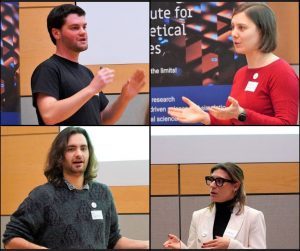Girls, let your geek flag fly!

What happens to a neutron star after its formation? Why are big media cooperations looking for molecular biologists? How big can proteins be? Our scientists answered these and more questions at an event hosted by HITS and organized by ZOrA, a cooperation between the Heidelberg University of Education and Heidelberg University.
On Thursday, eleven young women met up at the Carl Bosch Auditorium with four HITS scientists to learn about their area of expertise, motivations and goals. Group members of Stellar Evolution Theory (SET), Dr. Eva Laplace and Jan Henneco told their keen audience about the lives of stellar objects. Emphasizing on the complex rhythm of the universe, the astrophysicists patiently broke down the core of their research. Dr. Giulia Paiardi and Jonathan Teuffel from the research group Molecular and Cellular Modeling focused on the basis of their research and the increasing importance of molecular simulations. They also highlighted the contribution of women in this area, as many female scientists are amongst the leading experts in this field.
After the Q&A sessions at the auditorium, the girls got a short tour of the HITS and got to sit down with the scientists. Munching on pretzels, more questions were answered, including advice on how to best prepare for studying science. The young women left with a lot of thoughts and ideas, some as big as red dwarves, some as tiny as peptides.
About HITS
HITS, the Heidelberg Institute for Theoretical Studies, was established in 2010 by physicist and SAP co-founder Klaus Tschira (1940-2015) and the Klaus Tschira Foundation as a private, non-profit research institute. HITS conducts basic research in the natural, mathematical, and computer sciences. Major research directions include complex simulations across scales, making sense of data, and enabling science via computational research. Application areas range from molecular biology to astrophysics. An essential characteristic of the Institute is interdisciplinarity, implemented in numerous cross-group and cross-disciplinary projects. The base funding of HITS is provided by the Klaus Tschira Foundation.